Whether you believe green can be glamorous or not, the hospitality industry has gotten the memo. Boutique hotels are especially driving the sumptuous-meets-sustainability trend. From Australia’s Saffire Freycinet to Napa Valley’s Bardessano, these luxe escapes are appealing to well-heeled, eco-conscious travelers by proving that they are responsible, ethical and sustainable. Some are even going beyond providing organic bed linens and rainwater catchment systems; they’ve even committed to sourcing their own organic food and reducing their carbon footprint to zero. And as far as the guest experience? Well, it’s all about providing a fully immersive cultural experience that pays tribute to the natural surrounds. Here, we take a look at two elegant yet eco-friendly luxury hotels: Jamaica’s GoldenEye, a longtime celebrity favorite, and UXUA Casa Hotel & Spa in Bahia, Brazil.
GoldenEye
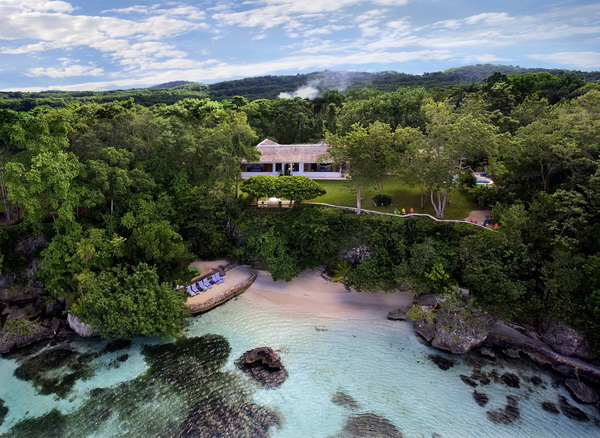
GoldenEye perhaps needs no introduction. Once the home of Ian Fleming (who wrote all 14 James Bond novels and entertained guests like Noël Coward, Errol Flynn, and Truman Capote), it is owned by Chris Blackwell, the founder of Island Records and the man personally responsible for making Bob Marley a star). Blackwell has been fiercely protective of the land upon which the now 52-acre resort rests.
“As a native son, I feel a deep responsibility to preserve Jamaica’s environment and develop sustainable practices,” he says.
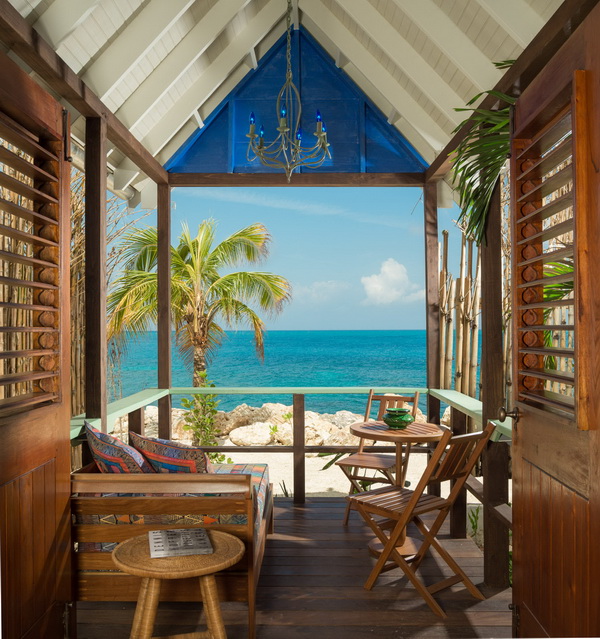 Even though he has increased the resort’s footprint over the years, he has expanded responsibly. Example: GoldenEye recently doubled its accommodations with the April launch of 26 beach huts. The huts are in line with Blackwell’s sustainability ethos; they are built in such a way to maximize the cool breezes that roll in from the ocean and surrounding hills, eliminating the need for air conditioning. The hotel’s expansion will also include a seaside bar and rooftop terrace, pool area, snorkeling cove, and bay-side beach, grill shack, and drink stand.
Even though he has increased the resort’s footprint over the years, he has expanded responsibly. Example: GoldenEye recently doubled its accommodations with the April launch of 26 beach huts. The huts are in line with Blackwell’s sustainability ethos; they are built in such a way to maximize the cool breezes that roll in from the ocean and surrounding hills, eliminating the need for air conditioning. The hotel’s expansion will also include a seaside bar and rooftop terrace, pool area, snorkeling cove, and bay-side beach, grill shack, and drink stand.
“Most of the food for the Island Outpost properties is grown there and they don’t use chemicals as Blackwell doesn’t like the way they smell,” explains a representative for Island Outpost, Blackwell’s collection of hotels in Jamaica. “There are 60 varieties of fruits, vegetables and herbs grown at Pantrepant, eliminating the need to import produce.”
Pantrepant is Blackwell’s personal farm, and recently returned to a more natural way of farming. Guests can enjoy a home-cooked Jamaican lunch under the sprawling, vine-draped Guango Tree or book the two-bedroom guest cottage for a longer visits to settle into the Trelawny country life.
“Chris’ vision on sustainability and eco-living are also carried throughout the various culinary options,” reveals the rep. “Head chef Mama J — trained by Blackwell’s personal chef — uses ingredients just picked from the farm: ackee, Otaheite apple, callalo drizzled with house-made scotch bonnet pepper oil. Sweet treats such as Blue Mountain coffee ice cream are also made on-site.”
Eye on Green: In 1995, Blackwell founded the Oracabessa Foundation. The organization has a strong commitment to improving the lives of the local community through a variety of initiatives, specifically in the areas of health, environment, education, sports, and entrepreneurship. Guests of GoldenEye are able to get involved and can plant a tree on the property (as celebrities like Johnny Depp, Kate Moss, Bill and Hillary Clinton, Mr. and Mrs. Carter – i.e. Jay Z and Beyonce, Jude Law, Richard Branson, and River Phoenix have done) with a donation to the Oracabessa Foundation. Another initiative supported by GoldenEye assists with increasing the population of the endangered sea turtles. Each year, thousands of baby turtles hatch at neighboring GoldenSea Beach in Oracabessa Bay, thanks to a local sea-turtle expert who has been studying the local turtle population for nearly a decade. Replenishing Jamaica’s fish stocks and re-growing coral (the waters surrounding Jamaica are some of the most depleted in the world) is another key initiative of GoldenEye and the Oracabessa Foundation. Guests staying in GoldenEye’s other Villa and Cottage accommodations who don’t use the air conditioning will also receive $25 per night deducted from the cost of their stay.
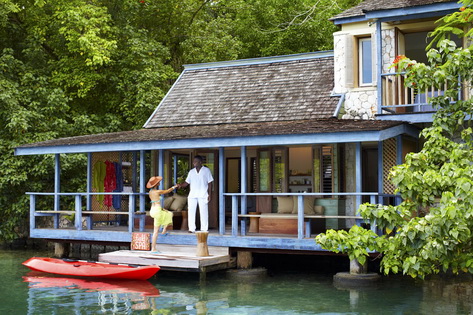
Pleasant Surprise: “GoldenEye sources most of its fruits and vegetables from Pantrepant, even GoldenEye’s FieldSpa oils are made from locally grown herbs,” the rep says.
Eco-Splurge: Stay in the five-bedroom Fleming Villa if you’re traveling with a larger group, recommends the rep. Sting famously wrote “Every Breath You Take” during a stay in this villa, so it will surely spark your creativity if not your senses. “If these walls could talk, they would tell tales of artists, writers and spies,” he adds. “Here, Fleming used to entertain the likes of Noel Coward and others of the jet set era.” Located on the edge of the cliff and overlooks the Caribbean Sea, the Villa includes a private swimming pool, media room, sunken garden and direct access to the private Fleming Beach, plus its own dedicated staff – a butler, housekeeper and cook. The Ian Fleming airport is located 10 minutes away, and ideal for private planes.
Uxua
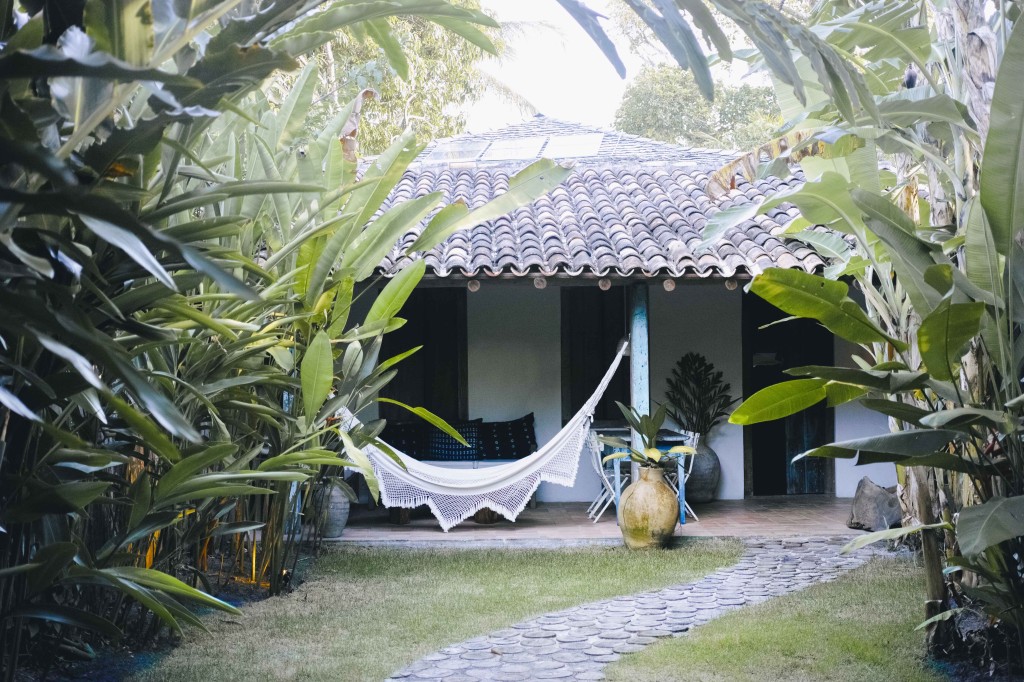
Nestled on the palm-lined coast of Brazil’s Bahia state in a small Bahian fishing village called Trancoso, UXUA Casa Hotel & Spa has brought “the real Trancoso” experience to affluent travelers via its location in historic Quadrado, the colorful UNESCO-protected town square with its uneven cobblestone streets and dirt roads. Half of UXUA’s nine casas date back 500 years to the village’s founding. The hotel was crafted using traditional techniques, reclaimed materials and antiques, all by local artisans collaborating with designer Wilbert Das. His business partner, Bob Shevlin, says their hotel concept was a response, in part, to “a consumer generation that recognizes a lot of the old formality and pretension in hospitality simply served as a mask for mediocrity and a lack of innovation.”
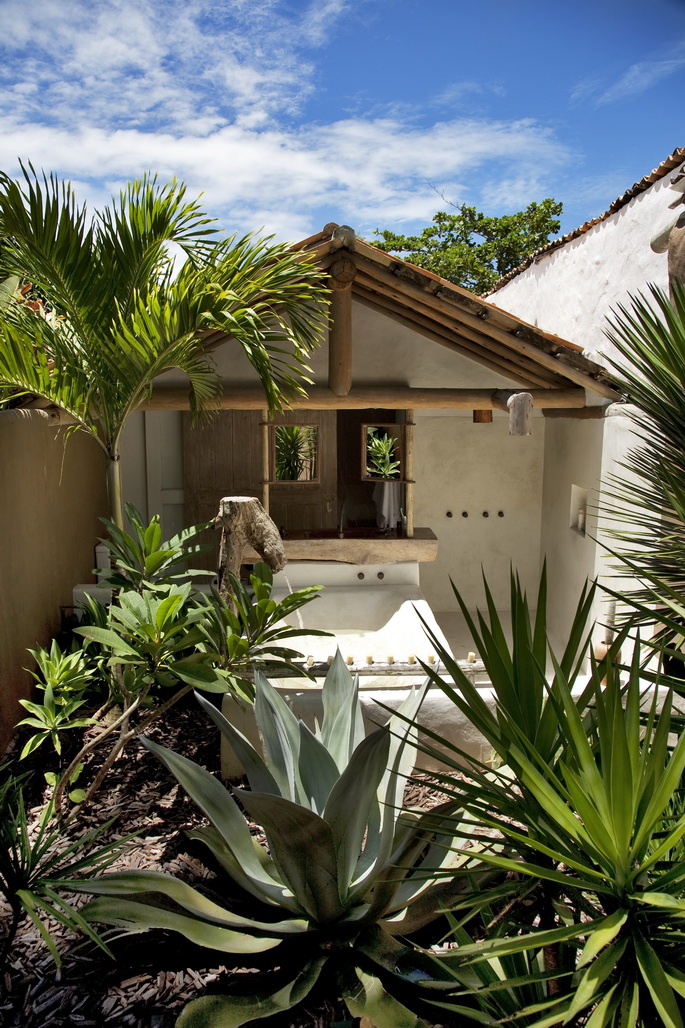 “UXUA won its loyal niche of high-end consumers simply by delivering what they want, something I myself was seeking before creating UXUA,” reveals Shevlin. “And that’s a destination which simply celebrates being local, and authentic, with a very strong sense-of-place different from anywhere else in the world. As the planet globalizes and homogenizes, locales which keep their identity become precious.”
“UXUA won its loyal niche of high-end consumers simply by delivering what they want, something I myself was seeking before creating UXUA,” reveals Shevlin. “And that’s a destination which simply celebrates being local, and authentic, with a very strong sense-of-place different from anywhere else in the world. As the planet globalizes and homogenizes, locales which keep their identity become precious.”
UXUA manages to deliver an experience of living among native families, combined with an ethos of sustainability and five-star service. The casas range from traditional a fisherman house facing Quadrado (take your pick between one, two or three bedroom options) to a well-appointed fantasy treehouse à la Robinson Crusoe.
“What we’ve always emphasized is working with reclaimed materials, utilizing only local craftsmen using with their own hands and traditional techniques, and integrating UXUA into our village harmoniously,” says Shevlin. “Our guests love this, it makes them feel rooted to this community when they stay here. I think it makes travelers feel good knowing that spending money in a hotel like UXUA is also a rejection of overdevelopment, a vote for leaving pristine areas pristine.”
Eye on Green: “Our guests always comment that they’re blown away by the details at UXUA,” says Shevlin. “In reality, what they’re noticing is that unlike most hotels, there is almost no repetition of details at UXUA. Almost everything around, from furniture and lighting to shower-heads and sinks, is either a one-of-a-kind handmade item we’ve created here, or an antique.”
Pleasant Surprise: “I am quite sure no one can guess the amount of time, energy, and money we spend on pro-environmental issues – by far the largest and most complex matter I personally work on,” says Shevlin. “We have a full-time professional, formerly the general manager of a very good hotel, who we hired and works full time in community organizations and lobbying local and federal governments about enforcement of environmental law. This effort also extends often to us teaching basic civics classes to our staff, and even coordinating local groups as diverse as churches, the local association of fishermen and athletic clubs, and the Explorers, i.e. the Brazilian Boy Scouts.” Shevlin sees the protection of the environment as the single biggest issue for securing Brazil’s tourism future, and “we really try to be leaders in this area.” In this way, UXUA guests are actually “funding” this, notes Shevlin. “I’m sure are happy their able to be a part of such movement.”
Eco-Splurge: The hotel has also taken a radical approach to development by reclaiming old homes while actually working to keep large native families living in the neighboring properties just steps away, literally side-by-side with the hotel guests. “We’ve never displaced a local person in creating UXUA, always reclaiming casas which were previously in the hands of foreigners,” says Shevlin. “Our goal is try to preserve this neighborhood mix which is absolutely precious.” Certainly there is a generational blend: “Next-door to UXUA’s Casa Zè and Zilda lives João, who at 92 is Trancoso’s oldest resident,” Shevlin tells us. “He was once Trancoso’s best carpenter and we even named one of our casas, Casa Seu João, after him in tribute. And on the other side of Ze e Zilda, a new baby was born to a young mother a couple weeks ago.” He loves the idea that his guests can sleep between Trancoso’s oldest and youngest residents. “The ultimate luxury is getting something that money can’t normally buy, which is a true human experience. It’s something that touches you deeply and enriches your soul.”


